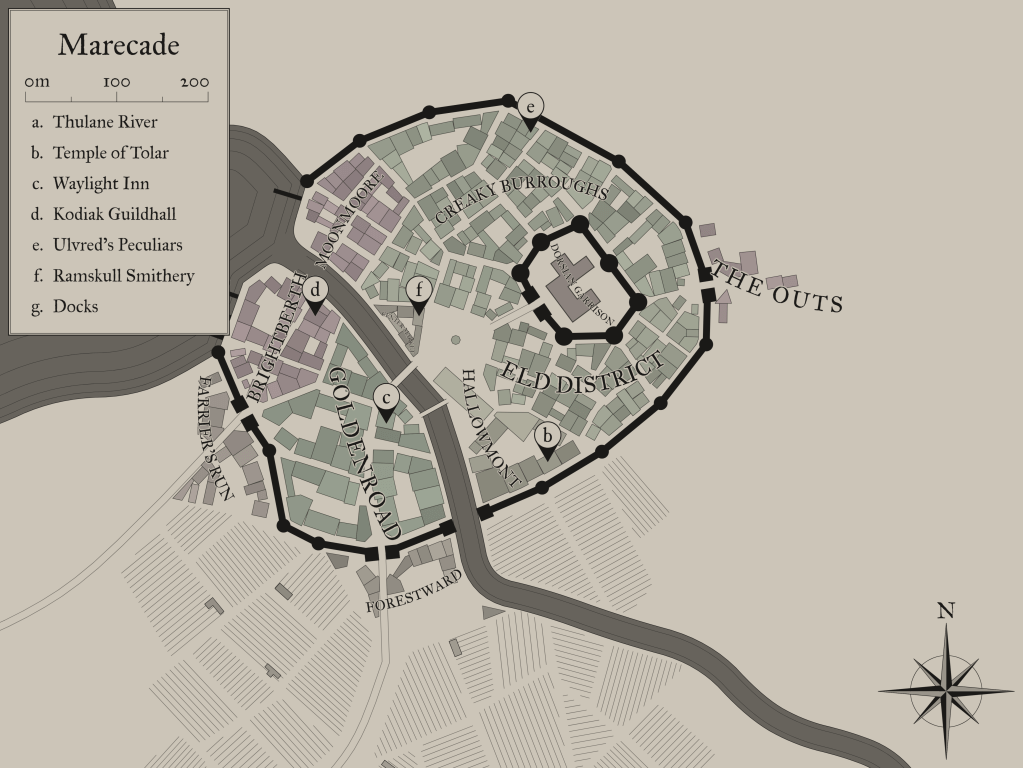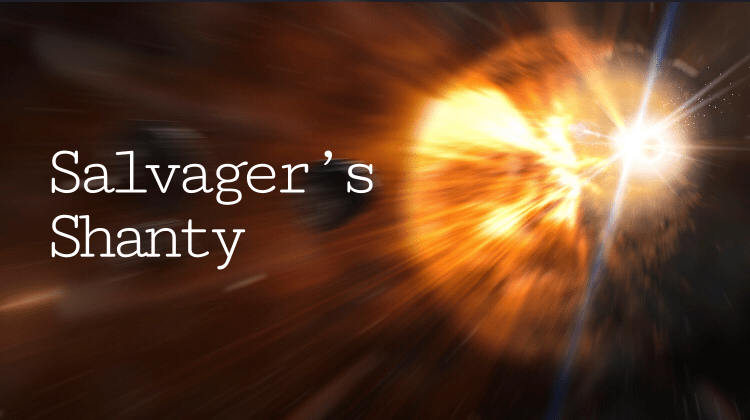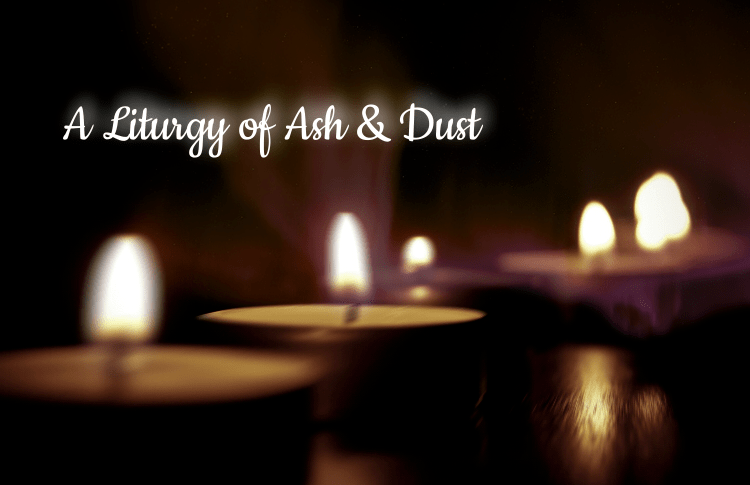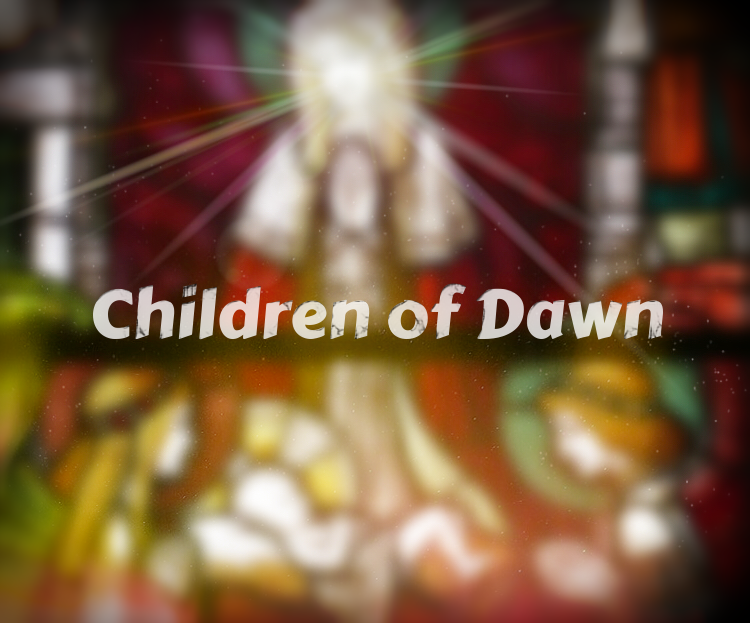At the base of the Kragen mountains was a small village named Grache. It was little more than a cluster of buildings, ten to twelve in number, surrounded by nothing but farmland for miles. Most of the buildings were unremarkable; private dwellings with a few shops peppered throughout. A little further up the road to the mountains sat a humble white stone temple overlooking the village.
On a typical morning, you could often find Father Eagen Ravenhart sitting on the steps there eating his morning meal.As a part of his morning routine, the Father would watch the sunrise over the village; buildings only jagged silhouettes as the sun began to crest the horizon, painting the rolling hills of the surrounding countryside with the pastel hues of dawn. It was truly a sight to behold; a bit of Lathander’s glory bleeding into this realm. There was a time when Eagen could almost hear the world hum awake around him, reverberating with the harmonies and resonances of the high heavens touching earth. At one time the sight and sound would have filled Eagen with such hope and fulfillment. But now, as each day the sun rose exactly as it had the day before, Father Ravenhart felt nothing.
Eagen had been given charge of Grache’s spiritual well-being as a young cleric, graduating out from under the tutelage of a much older and highly pious man in a much larger metropolis. Day in and day out, he’d tend to the needs of the townsfolk. He’d perform marriage ceremonies, bless infants, and recite funeral rites. He was present for every significant moment in the lives of each of the people who called Grache their home. And as he labored he did so in joy, and there was the hum.
But as time passed, many that he’d blessed as infants, and later consecrated on their wedding days, he’d then buried. Famines, bandits, wild beasts; the pitfalls of the savage world would take some before their time, and those same eyes that took in the dawn each morning watched the sun set on friends, neighbors, and even children, and those ears had to strain to hear the melody.
Despite all of this, he never faltered in his faithfulness to the little hamlet nestled in the mountainside. He had a responsibility to the townsfolk to be their shepherd, a pillar of the community and a symbol of Lathander’s blessed guidance, and he knew in his heart that despite his feelings, he could not disappoint them. His days were busy with the bustling eb and flow of the lives he helped to guide, and his nights were still and quiet as, through the years, the Morning Lord grew silent.
Each night, a little while after the last parishioner had left for the day, his hair still smelling of incense, Eagan would lie awake and wonder if, perhaps, that night would be his last. Maybe, just maybe, he would shut his eyes and would not have to endure another morning of the Dawn King’s hollow sunrise.
It was late on a night such as this that there came a knocking on the temple doors. It took Eagen a moment to register the sound amidst his nightly existential ponderations. Again it came, the unmistakable, rhythmic thudding of purposed hands upon the thick wood; it was not the wind, the Father had a visitor.
“Just a minute,” he called into the darkness as he took a small oil lamp from a sconce on the wall and turned its small flickering back up to a flame that would provide actual illumination for making his way to answer his late night summons. Grabbing the nearest thing to cover himself, his vestments, and throwing them on, he left his small room off the left side of the temple’s vaulted sanctuary, and made his way towards the door. Light from his lamp flickered on the rows of wood pews as large stained glass windows loomed over him at his back, rimming his balding head in dappled shades of moonlight.
It did not take the Father long to reach the door, only a minute or two, but when he took hold of the large twisted iron handles and heaved the thick double wooden doors open, his unexpected visitor was nowhere to be seen. The Father stuck his head out the doorway, peering to either side as he did, the cold night air stinging at his face. “Hello? Is anyone there?” he called into the still dark night. His call was met by only the soft rustling of leaves from a nearby tree, tousled by the light midnight breeze, and by the occasional chirp of the wayward insect or frog.
That was just great; local farmhand errand boys playing late night tricks on an old religious man- rabble rousers and buffoons the lot of them. If Ravenhart had a gold piece for every time one of the young townsfolk had shown him disrespect, he would be living the life of a noble. Lathander forgive them, they know not that they are fools…
Just as Eagen was getting ready to stomp back to bed, he caught sight of something at the bottom of the stairs; a small crate. Ravenhart recognized it as an offering crate. The townsfolk would occasionally make sacrifices and offerings to Lathander as part of their petitioning for high harvest yields, or favorable marrying partnerships. Exactly who, in their right mind, would be making deliveries at this hour however, the Father knew not.
For a brief moment, Eagen considered leaving the crate there and dealing with it in the morning, but occasionally small birds or mammals were sacrificed and it would reflect very poorly on Eagen if some stray dog or wild beast got to it in the middle of the night before it was properly offered to Lathander. That would not be an easy thing to live down, for word traveled fast and completely in Grache.
Eagen bent to pick up the crate and was surprised by the weight of it. Must not be a bird this time, maybe a piglet or lamb. Upon closer inspection, he could see that it was lined with straw, and amidst the straw was a tightly bundled blanket. Leaving the crate on the ground, Eagen lifted the bundle out. It did not squirm, or make any noise, and for a split second, the Father thought he may have been wrong in his earlier assessment and that it wasn’t a living sacrifice at all. And then, he found the loose end of the blanket and unrolled it a small amount, and what he saw then he had not expected at all. It was the face of a child, asleep, hair still covered by the blanket.
In an instant a myriad of thoughts ran through the Father’s mind. Who had left this poor babe here? Was it intended as a sacrifice? Lathander was not the type of god to demand the children of his faithful, in fact, he was the very deity of birth and renewal, and Eagan was damn sure that such an offering was blasphemous. Then why? Why leave this child with him? In such a town where more offspring meant more help on the family farm, the pure economic absurdity of abandoning one’s child in Grache gave the Father great pause.
He could not tell if it was merely the moonlight, or if the infant was the bearer of some infection or malady, but its skin appeared to have an almost grey pallor to it. That’s it, perhaps the babe was brought to him for healing, though why the child’s guardian would flee and not stay to witness their ward cured, was beyond him. Eagan raised his hand to the infant’s forehead to feel its temperature and as he did so, he brushed the swaddle from the top of its head. The babe was indeed hot to the touch, but it was what the Father saw, not what he felt, that alarmed him in that moment. In was then that the infant awoke. It stayed silent as its eyes fluttered open; staring back at Eagan with strange pupiless, fully white eyes. Even more alarming, Eagen could now see two small horns on the top of the infant’s forehead, each about an inch in length.
“By the dawn… ” he exclaimed. The infant just looked up at him, silent. It had yet to make a sound that the Father had heard, not a wail, not even a burble. Eagen found his breath shallow as he recalled tales he had heard of such creatures as the one he now held.
He recognized, though he had never seen one in Grache, that he now held within his arms a Tiefling child. They were said to be the descendants of hellspawn; to have the very blood of demons in the their veins from the ancient times. Eagen’s knowledge on these demon-folk was not extensive, but he seemed to remember hearing that though descended from demons long ago, they were not inherently demonic themselves necessarily. Still, they had a reputation for being treacherous, thieving, maniacal and generally wise to avoid.
Had this infant been left on any other doorstep in Grache, Eagen thought, the simple farmers and their wives would riot in the streets. For simple folk understand little, and all fear what they don’t understand. So the reasoning behind why this babe was left with him made some sense, but it still left Father Ravenhart with so many questions.
“What’s your name, little one?” the Father asked after a minute, mostly to himself, perceiving the babe to not be of speaking age. The only sound was that of Eagen’s own voice, but it’s gentle timbre in that moment surprised Eagen.
“Where is your mother?” It was hard for Eagen to imagine any Tiefling living in Grache. He must have come from some traveling mother’s act of desperation as she passed through the village, maybe on her way to the mountains. Regarding the simple folk, she may have very well been on the run from a lynch mob, and thought that maybe she could lead them away and at least keep the infant safe, but there was no way to know for sure.
It was then that the babe let out a small coo. The first sound Ravenhart had heard it make; one of contentment really, not trauma. Whatever this little one had gone through in the short time it was alive, they seemed to have been adequately sheltered from it, or to be taking it in stride.
“Now what am I to do with you?” Eagen said as he loosened the blanket, freeing the infant’s arms from its side. As the Father looked down on the small grey-skinned bundle, he did not feel the soul of a demon behind those small, pupiless white eyes. As he watched the babe play with its own fingers in front of its face, and as it briefly managed to grasp a handful of the Father’s beard and tug it gently before losing its fumbling grip, he did not feel malicious intent or nefarious purpose. Nor did he feel afraid when looking at the small thing in his arms that had supposedly descended from demons millenia ago. What he did feel then, a moment later, was the chubby fingers of a tiny hand grasp his finger with all of its little might, and this time, the grip persisted. And as that tiny hand held tightly to his finger, the Father felt something else. He felt a warmth he hadn’t felt in ages; the deep, humming warmth of the coming dawn.









